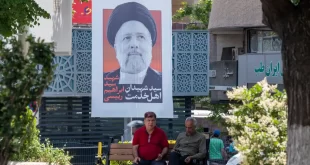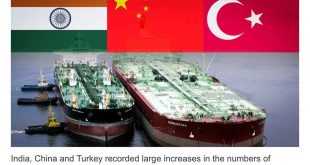TEHRAN, Mar. 13 (MNA) – Omid Shokri believes that Russia’s disagreement with cuts in OPEC Plus production could be a good opportunity for Moscow to influence US oil exports.
While the spread of Coronavirus outbreak worldwide has already had a profound effect on the world economy and has led to a recession in many countries, Saudi Arabia has increased its oil production in an unprecedented way, following a dispute with Russia which has led to a sharp drop in oil prices.
To know more about the Coronavirus impact on the global economy and Saudi Arabia’s decision on the world economy and even on the political fate of the Saudi crown prince Bin Salman, we reached out to Dr. Omid Shokri.
How do you see the effect of the Coronavirus outbreak on the global economy?
The spread of the coronavirus since early January has been one of China’s biggest socio-economic and security challenges. Most countries in the world have taken special measures to combat the spread of the virus and have evacuated their citizens from China. Some major companies in the world, including Apple, have closed their factories in China. Economic experts report that one reason for the decline in demand is the reduction of air transit. Based on the assumption that domestic and international air transport in China has always had a serious impact on China’s economy, there can be a direct correlation between the decline in air travel and transfers and China’s economic-trade indices.
In addition to being a major consumer of energy, China is also one of the largest exporters of industrial products. Any interruption in the production of industrial plants in the country will make exporting a major challenge. Any crisis in the country, if not managed and controlled effectively by the government, will have a negative impact on the country’s economic growth in the short and medium-term. Economic experts report that one reason for the decline in demand is the reduction of air transit. Based on the assumption that domestic and international air transport in China has always had a serious impact on China’s economy, there can be a direct correlation between the decline in air travel and transfers and China’s economic-trade indices.
Saudi Arabia has increased its oil production despite the Coronavirus bad effect on oil prices. Can this act of Bin Salman affect his own political future and Saudi’s economy?
Saudi oil resources and oil policies play a primary role in the kingdom’s dealings with the outside world. Yet in light of recent international outrage over various Saudi abuses and atrocities, such as the killing of journalist Jamal Khashoggi, the country is focusing more and more on plans for diversification under Vision 2030.
Oil prices will continue to play a significant role in Saudi Arabia’s economy, but whether Saudi Arabia can maintain oil prices to provide a steady stream of income, is a matter that must be coordinated with the OPEC, of which it is a powerful member state. Success in this arena will require coordination among the ruling Saudi government, the US, and the other major oil powers.
According to reports, the US has announced that it will be able to supply 80 percent of the world’s oil demand through its own shale oil supplies within the next three years. While this may be exaggerated, the US seems intent on keeping oil prices at a level of at least $55 to $60 per barrel over the next three years. At this price, Saudi Arabia can be confident over the next few years of a steady income stream from oil.
Oil prices will continue to fall if Saudi Arabia’s decision to increase production in April is implemented. Aramco does not appear to be willing to reduce its market share, and perhaps it will increase production for a certain period of time. The lack of economic production of shale oil will reduce oil production in the US. It may be able to import oil at a cheaper price, but its dependence on imported oil will increase. Even the Trump administration, which has made the slogan of energy independence a pivotal point in its national energy policy, will in effect fail.
Saudi Arabia will be a serious rival in attracting foreign investment to the countries of the Middle East and North Africa, including Iran, in line with the principles and plans outlined in the 2030 vision plan, and this could spell added tensions in the region.
The principal benefits of the Saudi diversification program, if achieved, are that it would buoy the Saudi economy and decrease the vulnerability of the country to fluctuations in the global oil market. However, the implementation of this large program is dependent on oil revenues and the ability of the country to procure investment from abroad. Saudi Arabia’s oil marketing strategy, on the other hand, continues to expand investment in the refineries of countries with demand growth potential, especially China.
The consequences of the sale of part of Aramco, one of the first steps in this process, will likely be daunting to policy-makers, and may intensify internal disputes; yet, the sale of stock could be the beginning of a wave that provides a model for other governments with similar challenges in the region.
Can Saudi’s measure affect the country’s relation with Russia?
Russia’s disagreement with cuts in OPEC Plus production could be a good opportunity for Moscow to influence US oil exports. Reducing oil prices to the extent that stopping shale oil production would benefit Russia. An increase in shale oil production has led the US to cut Saudi oil imports as well. If shale oil production is not economical, it would mean lower US oil production – rising oil imports and unemployment in the oil industry. Given Trump’s economic growth during the Trump era, the decline in shale oil production and the closure of shale oil wells will not be good news for the Trump administration. Trump has no desire to reduce his vote in the presidential race. Any economic crisis coupled with the growing impact of the Coronavirus on the US economy is a serious threat to the Trump administration and the upcoming presidential election.
Iran’s oil sanction has put Russia in a position to increase its share of the oil market. The Russians are a serious competitor in both the oil and natural gas markets, and the economic boycott is an opportunity for the Kremlin. Moscow is not ready to step back from the market at a time when the United States has become a black gold exporter by producing shale oil. Low oil prices have a direct impact on US shale oil production and supply; in other words, shale oil production is not profitable. Given this slump in price overnight over the past three decades, the Russians will not leave the scene as long as cheap oil does not affect natural gas prices. The Moscow-Riyadh dispute over the market and, ultimately, cheap oil, whatever its impact, will be the major losers in the US oil companies investing in shale oil production. In addition, stopping the downward trend in oil prices will require the end of the Riyadh-Moscow battle on the market, declining production in North America and the result of the global fight against the spread of the Coronavirus.
Dr.Omid Shokri is an analyst at [Perian] Gulf State Analytics and a Senior Energy Diplomacy and Energy Security, Analyst.
Interview by Payman Yazdani
mehrnews.com





